


Like Dune 2000, the game featured all new full-motion video cutscenes, somewhat based more on the original movie.

Further, the game's bad AI includes a lack of combining units of different abilities as the missions cannot be won by building only a particular type of combat unit. The three Houses also featured new units in their ranks, with new abilities.Ĭriticisms of the game are not as much as that of its predecessor, Dune 2000 but it still suffered from poor AI with the computer controlled player attacking the human player with a similar strategy that can be predicted and thereafter countered effectively. Features of note are the fairly non-linear campaign, featuring randomized events, and the fast pace relative to the earlier Dune games. While having an interface similar to the Command & Conquer series, Emperor: Battle for Dune added enough features - such as a 3D engine and in-battle reinforcements - to provide a change of pace. If enough damage is dealt to a worm (half of the visible health), it will simply disappear. In addition to enemy incursions, the player must also deal with periodic appearances of the sandworm, capable of swallowing vehicles and infantry whole, as well as harsh weather conditions that can deteriorate the structures of the player's base. The basic strategy in the game is to collect spice with harvesters from sand dunes, have it brought back and refined for credits, and to build and purchase military combat units with credits in order to fend off and ultimately destroy the enemy.

The player takes the role of a commander of one of three interplanetary houses, the Atreides, the Harkonnen or the Ordos, with the goal of gaining control of Arrakis from the two other houses. Striking a balance between complexity and innovation, it was a huge success and laid the foundation for Command & Conquer (which was nicknamed Dune III by fans and detractors alike), Warcraft: Orcs & Humans, and other RTS games that followed. As such, Dune II is considered to have originated the real-time strategy genre of today. While not the first real-time strategy game created, Dune II had a major impact on the genre, establishing the principal concepts which were followed by nearly every RTS since that time.


 0 kommentar(er)
0 kommentar(er)
